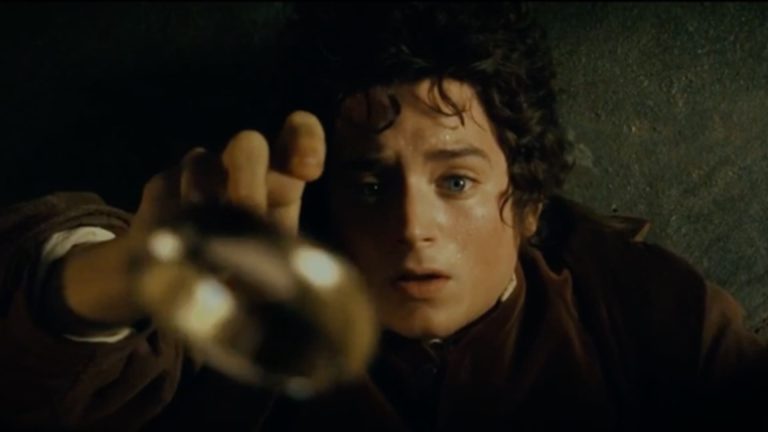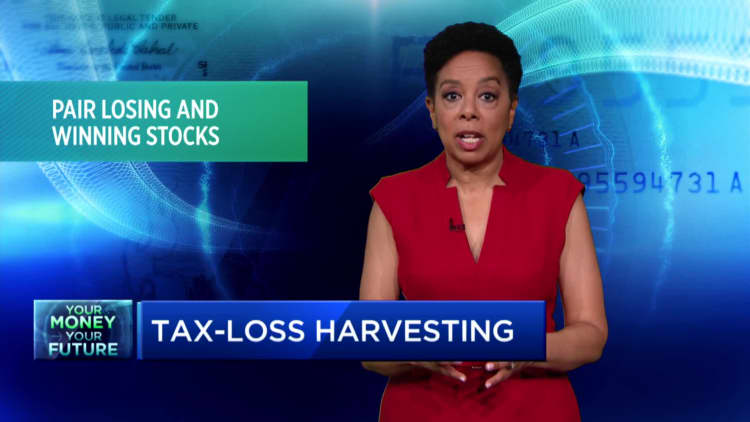
[ad_1]
Elijah Wood as Frodo in “The Lord of the Rings” film trilogy.
Courtesy: New Line Cinema
The One Ring that collectors were coveting this summer wasn’t found in Hobbiton or deep in the tunnels of the Misty Mountains; nor was it discovered in the Elf stronghold of Rivendell, the realm of Gondor or even beyond the Black Gates of Mordor.
It was found in Toronto last month.
And the ring bearer — if they choose to sell the “precious” — may owe a hefty tax bill on the profits. Their tax rate could be as high as 53.53%.
In this case, the One Ring isn’t the physical ring forged by the Dark Lord Sauron in the fires of Mount Doom and coveted by all manner of creatures in Middle Earth, as outlined in the author J.R.R. Tolkien’s “The Lord of the Rings” trilogy.
Instead, it’s an ultra-rare playing card in “Magic: The Gathering.”
Seven-figure bids in the quest for ‘The One Ring’
Wizards of the Coast — the company that created the Magic playing card game in 1993 — issued a “Lord of the Rings”-themed set in June, and featured a “One of One Ring” promotion. One pack contained “The One Ring,” a serialized card of which there’s only one in existence.
Public bids for the one-of-a-kind card — printed in traditional foil and in the Black Speech of Sauron using Tengwar letterforms, according to Wizards of the Coast — have extended into the millions of dollars.
The “One Ring” serialized card is a one-of-a-kind Magic: The Gathering card issued in June. Bids for the collectible, which is part of a special “Lord of the Rings” themed Magic edition, have extended into the millions of dollars.
Wizards of the Coast LLC
One would-be buyer — Gremio de Dragones, a game store based in Valencia, Spain — offered 2 million euros, about $2.2 million or 2.9 million Canadian dollars. (Its bid also included travel and lodging expenses and a free paella dinner.)
Another interested party — Dave & Adam’s, a collectibles shop near Buffalo, New York — offered $1 million.
Wizards of the Coast, which is owned by Hasbro, confirmed the card had been found as of June 30. The finder — who remains anonymous — reportedly lives in Toronto, the biggest city in Canada and the capital of the province of Ontario.
The odds of finding the card were roughly 1 in 3 million. (By comparison, the odds of winning the Powerball jackpot are about 1 in 292 million.)
“To me, it’s almost the equivalent of a lottery ticket,” said Scott Plaskett, a Toronto-based certified financial planner and managing partner and CEO at Ironshield Financial Planning.
More from Personal Finance:
How to avoid this tax on high earners
Here’s what a new Supreme Court case could mean for federal wealth tax proposals
The IRS plans to tax some NFTs as collectibles — and the rich would pay up to 28% on profits
How Canada taxes capital gains
However, unlike lottery winnings — which are tax-free in Canada — The One Ring’s finder would generally owe tax on profits incurred from a sale.
The U.S. also imposes a tax on profits, known as a “capital gains” tax. It applies to stocks, bonds, real estate, collectibles and other assets.
In both countries, the tax is judged on “cost basis,” a term that refers to the original purchase price. The net profit is the leftover sum after subtracting the cost basis and other potential line items like costs incurred by the seller (like a broker’s fee, for example).
But the Canadian and U.S. tax systems differ in how they levy a capital gains tax.
Roger Perzan dressed as Sauron from “The Lord of the Rings” poses for a photo at the Fan Expo in Toronto on Sept. 4, 2015.
Marta Iwanek | Toronto Star | Getty Images
The Canadian who acquired The One Ring card would most likely pay tax on half their profits. The rest would be tax-free, experts said.
This is due to Canada’s use of an “inclusion rate.” Depending on the scenario, only a portion of profits are typically counted (i.e., included) as taxable income.
The share depends on how the card was acquired, Plaskett said. The inclusion rate is generally 50% — and that would likely apply in this scenario, he said.
If The One Ring card were sold for 2 million euros — which appears to be the current top bid — then 1 million euros (about CA$1.46 million) would be taxable.
“We used to do it that way in the U.S. but changed it a number of years ago,” Howard Gleckman, senior fellow at the Urban-Brookings Tax Policy Center, said of omitting a share of profits from tax.
Total Canadian tax bill is ‘subjective’
But what’s Canada’s tax rate on the profits?
Due to the large sum of money involved, the seller would likely be taxed at Canada’s top income tax rate, experts said.
In Ontario, the top tax rate is 53.53%. This includes both federal and provincial taxes.
Because just half of the seller’s profit would be taxed in this example, the individual’s back-of-the-envelope effective tax rate on the transaction would be about 26.8% (or, half of 53.53%). The total tax bill could therefore be up to roughly CA$780,000 in this example (which translates to about $588,000.)
(In reality, the effective tax rate would be slightly lower since Canada’s income tax system is progressive, as in the U.S., experts said. That means most, but not all, of the profits here would taxed at the top rate.)
To me, it’s almost the equivalent of a lottery ticket.
Scott Plaskett
Toronto-based certified financial planner
There are alternate taxation scenarios, however, experts said.
For example, if The One Ring card were accidentally dropped by its owner and then subsequently picked up on the street by someone else, the method of acquisition would change, Plaskett said.
The inclusion rate would likely jump to 100% in this case — meaning all the profits would be taxed at 53.53%, doubling the total tax bill, he said.
In some cases, Canadian law also taxes 100% of the profits (instead of 50%) depending on a seller’s intent, said John Oakey, vice president of taxation at Chartered Professional Accountants Canada.
For example, if the person who found The One Ring card were the owner of a collectible store — and buying and selling cards was their business — a sale may be intended as a business transaction, in which case all the profits would be taxed.

There’s some ambiguity here, though, Oakey said. For example, what if the card’s owner — even if it was a hobbyist collector — put considerable effort into maximizing their profit by, among other things, proactively soliciting bids from numerous potential buyers?
The Canada Revenue Agency (Canada’s equivalent to the IRS) might also treat the sale as a business transaction in this case — in which case the full CA$2.9 million would be taxed at 53.53%.
“It’s a subjective area,” Oakey said. “It’s not black and white.”
How the U.S. taxes capital gains
In some ways, the U.S. system is more concrete, he said.
That’s because preferential capital gains tax treatment in the U.S. is based on duration.
If an asset like a stock is bought and held for a year or less, profits don’t get preferential treatment. They’re treated as a “short term” capital gain, taxed at ordinary income tax rates, which are as high as 37% at the federal level.
A “long term” capital gain applies to assets held for more than a year. They get preferential treatment.
Sir Ian McKellen as Gandalf and Elijah Wood as Frodo in “The Lord of the Rings: The Fellowship of the Ring.”
New Line | WireImage | Getty Images
Here, there’s a distinction between collectibles and assets like stocks, however. Stocks are taxed at a top long-term federal capital gains tax rate of 20%; but collectibles have a top rate of 28%. (In both cases, there’s also a 3.8% net investment income tax for high earners, in addition to any state and local taxes on capital gains.)
The One Ring card would “almost definitely be deemed a collectible,” said Joe Hughes, federal policy analyst at the Institute on Taxation and Economic Policy.
For example, a seller in Michigan would pay a top long-term capital gains rate of about 36% on a collectible item, Hughes said. The rough total tax bill on the $2.2 million top bid would be about $792,000 in this example.
In a state like Tennessee, which doesn’t levy a state income tax, the top long-term capital gains rate would be 31.8%.
In other words: The ring bearer would appear to fare better in Canada over the U.S. — from the perspective of tax rates, anyway.
Of course, whether Ringwraiths descend upon the ring bearer from the lair of Minas Morgul, or whether men ensnared by the evil, corrupting grip of the ring try to snatch it from the ring bearer’s grasp, this publication cannot say.
[ad_2]
Source link